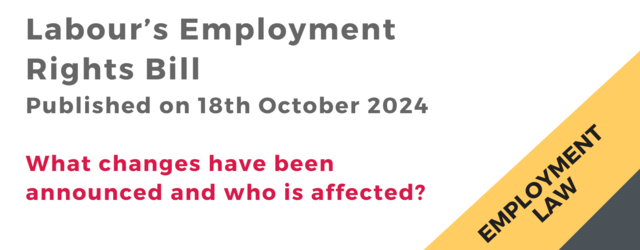
Son successfully contests late mother's £700,000 will after evidence revealed his sister “helped” her sign it
In a recent legal case, a son successfully contested his late mother's £700,000 will after evidence revealed that his sister had physically manipulated their ailing mother's hand to sign the document.

Domestic Abuse – What can employers do to support employees?
Domestic abuse is alarmingly prevalent in the UK. Employers should consider the impact of domestic abuse on employees as part of the duty of care and put procedures in place to support them.

Employment Law Changes in 2024 and What Employers Can Expect for 2025
The UK employment law landscape has undergone significant changes in 2024, and more updates are on the horizon for 2025 and beyond. These reforms impact employers, demanding careful consideration by them to ensure they are legally compliant and ensuring they are following best practice.

The Risks of Divorcing Without a Formal Financial Settlement
According to the findings of the FairShares research project in November 2023, just one-third of divorcing couples finalise their finances through a court order. Without a court-approved financial remedy order (known as a Consent Order), divorcing couples may find themselves subject to claims being made against their assets and pensions in the future, many years after the divorce proceedings have been finalised. Our Legal 500 Recommended Family Law Solicitors in Sheffield, Chesterfield and Mansfield are here to support you every step of the way.

Business First Magazine - Autumn/Winter 2024
Welcome to the Autumn/Winter edition of Business First Magazine.

Labour’s Employment Rights Bill: What changes have been announced and who is affected?
The Labour government’s new Employment Rights Bill (published on 18th October 2024) introduces significant changes that aim to improve job security, expand worker protections, and increase flexibility for millions of employees across the UK. Katie Ash, Head of Employment Law at Banner Jones, breaks down some of the key changes and explains who will be affected.

Updates to Sexual Harassment Laws – is your business ready?
As of 26 October 2024, every employer has a legal duty to take proactive measures to prevent sexual harassment in the workplace. This change in the law comes at a time where sexual harassment claims against well-known TV presenters and businessmen are dominating the headlines.

Landmark Renters’ Rights Bill — Implications for Private Residential Landlords
Residential landlords will need to shape up for the forthcoming legislation set out in the Renters’ Rights Bill put forward by the government. The banning of Section 21 of the Housing Act 1988 as a method for evictions will provide greater security for tenants, alongside a raft of other proposed changes. Smaller scale landlords, in particular, are likely to be affected by the changes.

Fire and Rehire Laws – a timely reminder
A recent Supreme Court decision against Tesco serves as an important reminder of the risks of employers using ‘fire and rehire’ to impose changes to terms and conditions and how this should only be used as a last resort.

Injured on a package holiday, can I make a personal injury claim?
If you, or a family member, suffer an injury or illness on holiday that was not your fault, you may be able to make a personal injury claim in the UK against the package holiday operator.

Can Dog Bite Injuries lead to Personal Injury Claims?
Dog bite injuries can be traumatic and often result in significant physical and emotional consequences. In addition to the immediate physical harm, dog bite injuries can also give rise to complex legal issues, particularly concerning personal injury claims. Understanding the causes, consequences, and legal aspects of dog bite injuries is crucial for both victims and those potentially liable.

Can Bedsores (pressure sores) lead to a Personal Injury Claim?
Bedsores, also known as pressure sores or decubitus ulcers, are painful and often preventable injuries that can occur when someone remains in the same position for an extended period. In cases where negligence or inadequate care contributes to the development of bedsores, victims may have grounds to file a personal injury claim.

How do Child Protection Conferences Work?
Child Protection Conferences involve multiple professionals from various agencies, such as social services, health services, education, police, and sometimes representatives from voluntary organizations. This ensures a comprehensive understanding of the child's situation and facilitates collaborative decision-making.

The Bumpy Road Ahead: Understanding Personal Injury Claims Due to Pothole Accidents in the UK
Potholes can wreak havoc on vehicles and, more alarmingly, pose a serious risk to pedestrians and cyclists. Could you claim compensation for injury due to a pothole accident through a personal injury claim?

Navigating the recent changes in UK Employment Laws - April 2024
For HR managers and businesses alike, keeping abreast of Employment Law changes isn't just advisable—it's imperative. Here, Katie Ash, Head of Employment Law summarises some recent regulation changes which came into effect in April 2024.

Improved Redundancy Protection for Maternity Leave
New Regulations came into force on 6 April 2024 in England and Wales to give pregnant employees and those on maternity leave or family-related leave better protection from redundancy.

How to calculate holiday pay in 2024: an update on legislative changes
For many businesses, calculating holiday pay is a straight-forward process. Employers are, within the parameters of the law, able to dictate how many annual leave days or hours a staff member is entitled to.

What is Carer's Leave?
Carer's Leave is where employees apply to be absent from work to provide or arrange care for a dependant with a long-term care need.

Changes to statutory Paternity Leave come into force
The Paternity Leave (Amendment) Regulations 2024 have now come into force, bringing with them changes which see fathers or partners of children born or adopted after 6th April 2024 being able to take their paternity leave entitlement in 2 blocks of one week within the first year of the birth or adoption of their child.

Business First Magazine - Spring 2024
Welcome to the Spring 24 edition of our Business First magazine.

Positive Action not Positive Discrimination
People often talk about how certain groups are under-represented within workforces, but what steps can an employer take to redress this? Head of Employment Law at Banner Jones Solicitors, Katie Ash, discusses how employers can use a Positive Action approach to eliminate or reduce discrimination and help these groups access employment or training as outlined in the Equality Act 2010.

New transparency rules to keep companies squeaky clean
Company directors, people with significant control of a company, or anyone who files on behalf of a company, must ensure they comply with new transparency rules from March 2024.

An Office Romance – Should a workplace relationship be disclosed?
Disclosing a workplace relationship depends on various factors, including company policies, the working environment, and the nature of the relationship. Our Employment Law Specialists in Sheffield, Chesterfield and Mansfield, explain some considerations to help employees navigate what can sometimes be a complex situation.

Innocent banter or workplace discrimination?
Workplace banter is driving a surge in claims against employers with research showing that 66 claimes relating to banter were heard in employment tribunals in 2022.

Minimum wage changes – is your business ready?
The Government has announced new National Minimum Wage rates for 2025, including the National Living Wage. The new rates which will come into force from 1 April 2025 - is your business ready?

